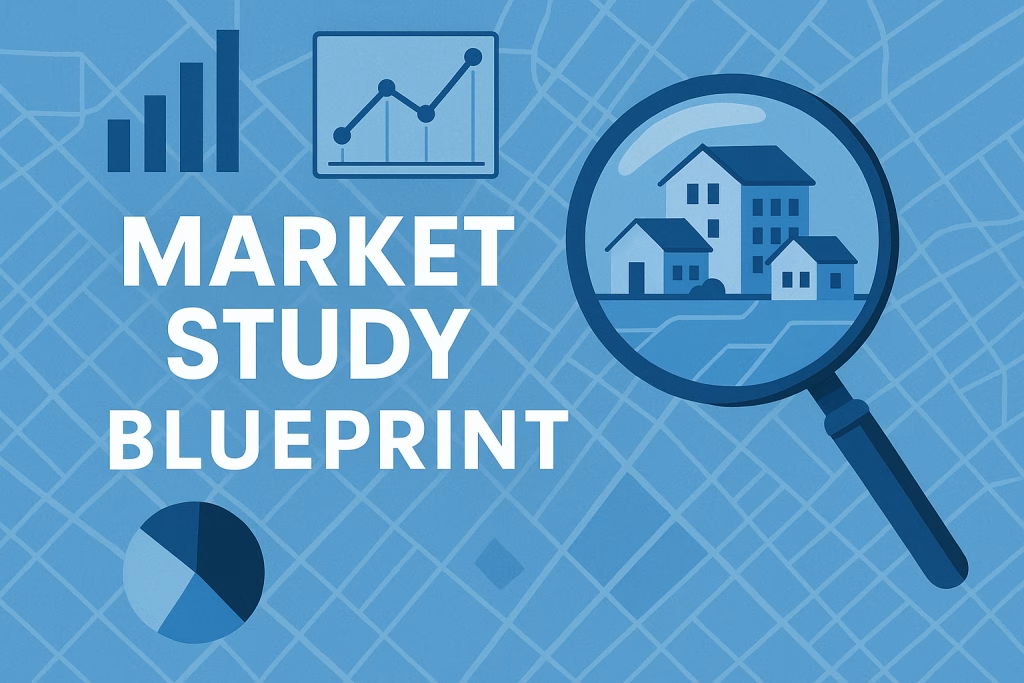Understanding Market Analysis in Real Estate
Definition of Market Analysis
Market study analysis is the secret weapon that top real estate professionals wield to transform raw data into winning strategies. Imagine stepping into a battlefield armed not just with intuition, but with crystal-clear insights on property values, buyer behavior, and emerging trends. By combining compelling storytelling, neuromarketing cues, and real-world case studies, this article will guide you—step by data-driven step—toward outpacing competitors and capturing market share in Egypt’s dynamic property landscape.
Market analysis in real estate refers to the systematic evaluation of various market factors to understand property values, trends, and overall market health. It involves compiling data on sales, demand, and various economic indicators. Think of it as a detailed report card for the real estate market, guiding investors, buyers, and sellers alike.

Importance of Market Analysis in Real Estate
Why is market analysis crucial? Here’s why it holds significant weight in real estate decision-making:
- Informed Decisions: Accurate information on property values helps in making sound investments.
- Trend Identification: It highlights emerging trends, enabling proactive strategies.
- Strategic Planning: Professionals can tailor marketing efforts and pricing strategies effectively.
By leveraging market analysis, stakeholders can position themselves favorably, such as ERA Egypt, ensuring they stay ahead in the competitive landscape.

Leveraging Data for Informed Decision Making
Role of Data in Real Estate Market Analysis
Transitioning from the previous discussion, data is the heartbeat of market analysis. It empowers real estate professionals to make informed, strategic decisions that can lead to successful outcomes. Think of data as the compass that guides investors and agents through the complexities of the market.
Types of Data Used in Market Analysis
What kind of data is crucial for effective market analysis? Here are some key types:
- Sales Data: Historical sales prices and trends help assess property value.
- Demographic Data: Information on age, income, and population growth directs target marketing.
- Economic Indicators: Unemployment rates, GDP growth, and interest rates influence buyer behavior.
Utilizing this data allows professionals to identify patterns and forecast future movements in the real estate landscape.

Market Research Tools and Technologies
Overview of Market Research Tools
Continuing from the foundation of data in market analysis, various tools and technologies enhance the research process, making it more efficient. Market research tools allow real estate professionals to collect, analyze, and visualize data effortlessly. Some popular tools include:
- MLS Systems: Multiple Listing Services provide up-to-date property listings and historical sales data.
- CRM Software: Customer Relationship Management tools help track client interactions and preferences.
- Analytical Software: Programs like Tableau and Microsoft Excel are excellent for data visualization.
Advantages of Using Technology in Market Analysis
Embracing technology in market analysis offers numerous advantages:
- Efficiency: Automates data collection and reporting processes.
- Accuracy: Reduces human error through advanced algorithms.
- Insights: Advanced data analytics unveil hidden market trends.
These technological enhancements empower professionals to make swift, informed decisions in a competitive real estate environment.

Competitor Analysis and Positioning
Conducting Competitor Analysis
Building on our discussions of market tools, understanding the competition is vital for thriving in the real estate landscape. Conducting a thorough competitor analysis involves several steps:
- Identify Key Competitors: Determine who your main competitors are in the local market.
- Analyze Their Offerings: Look at property types, pricing strategies, and marketing approaches.
- Evaluate Their Performance: Examine their sales figures, customer satisfaction, and market share.
This analysis provides insights into what works well and reveals gaps in the market that can be explored.
Strategies for Positioning in Competitive Real Estate Market
Once competitors are analyzed, positioning becomes the next focus. Here are some effective strategies:
- Unique Value Proposition (UVP): Clearly define what sets you apart from competitors.
- Target Niche Markets: Focus on underserved segments to carve out a space for your business.
- Effective Branding: Use storytelling and customer testimonials to create a compelling brand narrative.
By implementing these strategies, real estate professionals can enhance their visibility and secure their place in a competitive market.
Trends and Forecasting in the Real Estate Market
Identifying Market Trends
Moving forward from competitor analysis, recognizing market trends is essential for staying relevant in real estate. Identifying these trends involves examining various data points and developments, such as:
- Price Movements: Tracking property price fluctuations reveals buyer sentiments.
- Consumer Preferences: Understanding what buyers desire—like eco-friendly homes or urban living—shapes offerings.
- Technology Influence: Appreciating how technology impacts buying behavior can inform marketing strategies.
By keeping a close eye on these indicators, real estate professionals can adapt to changes swiftly.
Importance of Forecasting for Strategic Planning
Forecasting plays a crucial role in shaping strategic plans. It enables stakeholders to:
- Anticipate Changes: Recognize upcoming shifts in supply and demand.
- Allocate Resources: Optimize marketing budgets and manpower based on projected trends.
- Mitigate Risks: Make informed investment choices, reducing potential losses.
By integrating forecasting into their strategies, real estate professionals can navigate uncertainties and set themselves up for success.

Case Studies and Success Stories
Real-Life Examples of Market Analysis Impact
Transitioning from the importance of forecasting, real-life case studies illustrate the powerful impact of market analysis in real estate. For instance, a small agency in ERA Egypt utilized extensive market analysis to identify an emerging neighborhood. This foresight enabled them to invest early, resulting in a 25% increase in property values over just a few years.
- Case Study 1: A luxury condo developer utilized demographic trends to tailor amenities for younger buyers, leading to quicker sales and higher profit margins.
Lessons Learned from Successful Real Estate Strategies
From these successes, several key lessons emerge:
- Adaptability: Stay flexible to changing market data and buyer preferences.
- Data-Driven Decisions: Rely on thorough analysis rather than gut feelings.
- Investment Timing: Analyze when to enter or exit a market with precision.
These insights reinforce the necessity of diligent market analysis in guiding informed and successful real estate strategies.
Regulatory Considerations in Real Estate Market Analysis
Understanding Legal and Regulatory Factors
Building on the lessons learned from successful strategies, navigating regulatory considerations is crucial in real estate market analysis. Legal and regulatory factors can significantly influence market dynamics. For instance:
- Zoning Laws: They dictate land usage and can affect property values and development potential.
- Disclosure Requirements: Real estate agents must provide certain information about properties to buyers, impacting decisions.
A clear understanding of these factors is essential for compliance and strategic planning.
Compliance and Ethics in Real Estate Market Analysis
Ensuring compliance fosters trust and credibility. Here are some key points to consider:
- Follow Fair Housing Regulations: Respect all demographics when analyzing market data.
- Transparency: Maintain honesty in reporting findings and avoid misrepresentation.
By adhering to ethical guidelines, real estate professionals not only protect themselves legally but also enhance their reputation in the market. This foundation allows for responsible decision-making and sustainable success.

Navigating Challenges in Market Analysis
Common Pitfalls to Avoid
Transitioning from compliance and ethics, it’s important to recognize the potential challenges in market analysis. Many professionals encounter pitfalls that can skew results or mislead strategies. Here are some common mistakes:
- Ignoring Local Trends: Focusing solely on national data can overlook specific regional dynamics.
- Overreliance on Outdated Data: Using old statistics may result in misguided decisions.
- Neglecting Qualitative Insights: Dismissing anecdotal evidence can lead to valuable market context being missed.
Avoiding these pitfalls is essential for accurate analysis.
Overcoming Obstacles in Real Estate Market Analysis
Overcoming these obstacles requires a proactive approach. Consider these strategies:
- Continuous Education: Stay updated on market trends and tools to enhance analytical skills.
- Utilize Advanced Tools: Leverage technology to streamline data collection and analysis processes.
- Engage with Local Experts: Collaborate with community insiders for comprehensive insights.
By overcoming these challenges, real estate professionals can enhance their market analysis, leading to more informed and successful decisions.

Future of Market Analysis in Real Estate
Emerging Technologies in Market Analysis
Building on the importance of navigating challenges, the future of market analysis is being transformed by emerging technologies. Innovative tools are not only enhancing data collection but also refining analysis processes.
- Artificial Intelligence (AI): AI algorithms can predict market trends by analyzing vast data in real-time.
- Big Data Analytics: Harnessing large datasets allows for deeper insights and improved forecasting accuracy.
- Blockchain Technology: Enhances transparency in transactions, protecting against fraud and inaccuracies.
These technologies open new avenues for accuracy and efficiency in market analysis. National Association of Realtors Market Data.
Trends Shaping the Future of Real Estate Market Analysis
As technologies evolve, several trends are shaping the future landscape:
- Increased Personalization: Tailored marketing strategies based on detailed customer profiles.
- Sustainable Practices: Growing emphasis on eco-friendly developments affecting market preferences.
- Remote Market Assessments: Virtual tours and online consultations have made property analysis more accessible.
Embracing these trends will enable real estate professionals to stay ahead and capitalize on new opportunities in an increasingly competitive market.
Unlock Your Competitive Edge Now
Q&A Section


